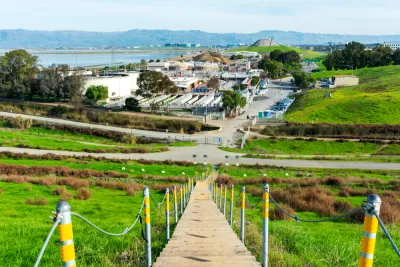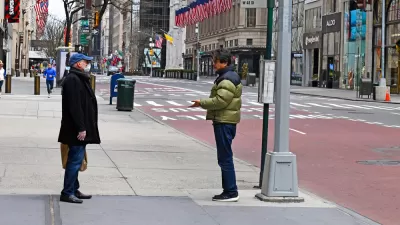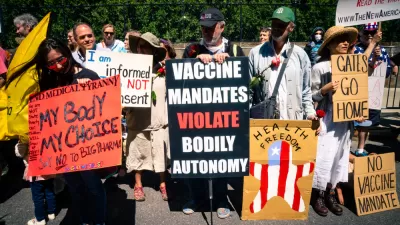Some scientists and city officials are moving ahead with a different way to track the virus’s spread: wastewater testing.

The fight against COVID-19 requires teaching people to recognize symptoms and make it as easy as possible for them to get tested. However, proactive action by individuals is not enough to understand the scope coronavirus spread. People can transmit the virus to others before experiencing symptoms, and some individuals catch COVID-19 and never feel sick.
This is why some scientists and city officials are moving ahead with a different way to track the virus’s spread: wastewater testing. It could detect the virus sooner than other methods, such as swab tests.
Here's a look at how this approach could improve public health by encouraging proactive measures.
Understanding the Spread in Neighborhoods and Vulnerable Groups
Public health authorities must learn more about where the novel coronavirus spreads the fastest to ensure hospitals are as well-equipped as possible. Moreover, getting details about the spread can confirm how societal trends worsen or reduce virus transmission.
One project involving university students and city officials in San Antonio, Texas received $160,000 in funding for an initiative spanning June to December 2020. The results allowed the research team to verify that holidays increased positive COVID-19 cases.
The pilot program sourced wastewater from treatment centers operated by the San Antonio River Authority. However, later initiatives may focus on areas that do not have easily accessible COVID-19 testing facilities.
In Ottawa, Canada, city officials and university researchers are collaborating to test the wastewater associated with a homeless shelter. Researchers pinpointed the residents there as among the most vulnerable. They believe this project could heighten public health awareness to benefit the community at large.
Keeping Communities Safer and Isolating Outbreaks
Succeeding with wastewater testing requires choosing dependable and rugged tools to collect accurate data. However, teams must also determine the best places to gather their samples. That's why scientists from the University of California, Berkeley met with authorities in the Bay Area before proceeding with a testing approach.
They identified sewersheds representing waste from a few thousand to several hundred thousand people. The team’s 12,000-square-foot mobile lab processes approximately 30 samples weekly for 11 agencies.
Civil engineering students at Ohio University get real-world wastewater testing during a semester-long project. They use an autosampler that gathers water every hour for 24 hours. The source material comes from five locations across the campus. Ohio University has other methods to curb the COVID-19 spread, including asymptomatic testing. Wastewater testing is one more tool against outbreaks.
Multiple groups in Fort Collins, Colorado are working together to test up to 65% of the population through an aggressive wastewater analysis plan. They hope to have a three-day turnaround, which would help public health officials act faster.
Relatedly, numerous campus authorities have quarantined two people based on wastewater test results. Those initiatives matter to all city inhabitants because students typically engage with wider communities rather than only staying on campus.
Finding Evidence of Emerging Variants
Viruses frequently mutate, which is why there are updated versions of the flu vaccine released yearly. The strain associated with COVID-19 has changed too, leading to several concerning variants. Some are currently more prevalent in certain areas—such as the United Kingdom and South Africa.
The measures taken so far include travel restrictions as scientists learn as much as possible about the new variants. That'll help, but it won't keep the variants at bay forever. That's because some cities have recently recorded cases of the virus despite not being in areas where researchers know a variant has become dominant or is thriving.
However, testing the wastewater could get authorities more informed or confirm what they already suspect. For example, in Burlington, Vermont, such analysis showed that a small number of individuals may have the United Kingdom variant called B.1.1.7. City officials took the opportunity to warn residents to show extra vigilance in keeping themselves safe.
Applying Technologies to Bolster Public Health
Even with vaccines now available, public health officials caution that people must use various preventive measures to stay safe, including washing their hands, wearing masks, and practicing social distancing. Along with these basic precautions, technologies could also stop outbreaks and keep people safer.
For example, wearable technology used at work sites facilitates contract tracing after someone identifies a positive case. Manufacturers are also working on unique materials they claim can kill the virus or reduce transmission. Those could be game-changers for slowing the spread on contaminated surfaces.
The examples above prove why people should not overlook wastewater screening methods in addition to other options. Many individuals never think of wastewater, especially when taking functional plumbing for granted. However, it could hold meaningful clues that make COVID-19 less prevalent in cities worldwide.

Maui's Vacation Rental Debate Turns Ugly
Verbal attacks, misinformation campaigns and fistfights plague a high-stakes debate to convert thousands of vacation rentals into long-term housing.

Planetizen Federal Action Tracker
A weekly monitor of how Trump’s orders and actions are impacting planners and planning in America.

Chicago’s Ghost Rails
Just beneath the surface of the modern city lie the remnants of its expansive early 20th-century streetcar system.

Bend, Oregon Zoning Reforms Prioritize Small-Scale Housing
The city altered its zoning code to allow multi-family housing and eliminated parking mandates citywide.

Amtrak Cutting Jobs, Funding to High-Speed Rail
The agency plans to cut 10 percent of its workforce and has confirmed it will not fund new high-speed rail projects.

LA Denies Basic Services to Unhoused Residents
The city has repeatedly failed to respond to requests for trash pickup at encampment sites, and eliminated a program that provided mobile showers and toilets.
Urban Design for Planners 1: Software Tools
This six-course series explores essential urban design concepts using open source software and equips planners with the tools they need to participate fully in the urban design process.
Planning for Universal Design
Learn the tools for implementing Universal Design in planning regulations.
planning NEXT
Appalachian Highlands Housing Partners
Mpact (founded as Rail~Volution)
City of Camden Redevelopment Agency
City of Astoria
City of Portland
City of Laramie






























